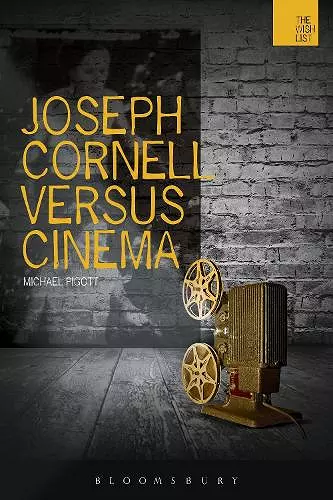Joseph Cornell Versus Cinema
Format:Paperback
Publisher:Bloomsbury Publishing PLC
Published:4th Jun '15
Currently unavailable, and unfortunately no date known when it will be back

American artist Joseph Cornell produced an extraordinary body of film work which is much less well known than his famous boxes and collage works. This book makes the case for the films' significance in the history of the 20th-century avant-garde.
This contribution to the WISH List of interdisciplinary studies in the humanities makes the case for the significance of Joseph Cornell's films, for both an Art History and a Film Studies audience. It should also have significant appeal to students of American Studies and all those interested in pop culture, celebrity and fandom.
This book is available as open access through the Bloomsbury Open Access programme and is available on www.bloomsburycollections.com.
Joseph Cornell is one of the most significant American artists of the 20th century. His work is highly visible in the world's most prestigious galleries, including the Tate Modern and MOMA. His famous boxes and his collage work have been admired and widely studied.
However, Cornell also produced an extraordinary body of film work, a serious contribution to 20th-century avant-garde cinema, and this has been much less examined.
In this book, Michael Piggott makes the case for the significance of Joseph Cornell's films. This is an important contribution to our knowledge of 20th-century culture for scholars and students of film and art history and American studies and for all those interested in pop culture, celebrity and fandom.
Compared to other aspects of Joseph Cornell’s art practice, remarkably little has been written about his films. Michael Pigott, in his rich and provocative engagement with these screen works, suggests that this critical silence “arises at least partly from the difficulty in accounting for [them] within contemporary frameworks.” These are films, he argues, that operate as “solutions to problems that have only now become apparent as such”—films whose significance and resonance we can now, from the vantage point of intervening decades, begin to unpack. Drawing inspiration from (among others) Siegfried Zielinski’s notion of anarchaeology and Michel Foucault’s archaeological investigations of sociocultural stutters and abrasions, Pigott proposes positioning Cornell as a central figure in “an alternate history of the twentieth century.” In this Cornellian century, the filmmaker takes his rightful place as a key antecedent of, or influential figure within, numerous movements or strains of practice: “revelationist” film, remix culture, slow cinema. * Cinema Journal *
ISBN: 9781474238458
Dimensions: 156mm x 232mm x 14mm
Weight: 170g
144 pages